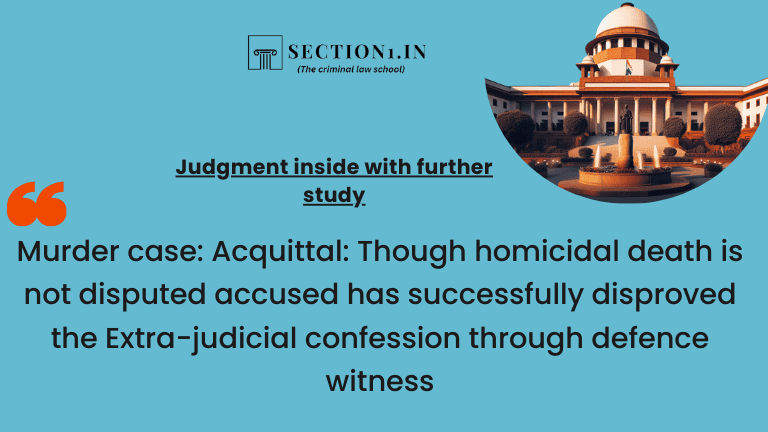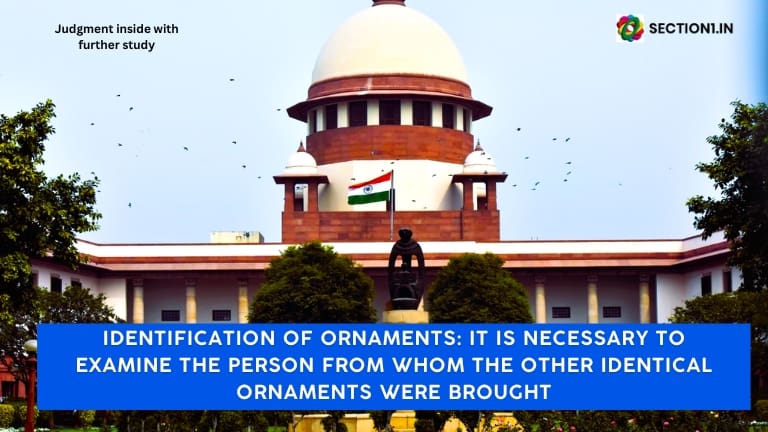ARGUMENTS ON UNUSUAL METHOD OF RECORDING CONFESSION
17.1. It has been contended that procedure adopted in asking questions, eliciting answers from the appellant-accused has been spoken to by PW-10 Mr. Kunjali who states that he did not know how to read and write Malayalam and yet police had asked him questions in Kannada who in turn had translated into Malayalam and elicited answers from accused in Malayalam and said answer was translated into Tamil by PW10 and same was typed out in Kannada by the police which is an unusual method of recording the confession of an accused and as such confession statement Ex.P-2 was not admissible evidence under Section 27 of the Evidence Act. To examine said contention we deem it proper to extract Section 27 of the Evidence Act and it reads:
“27. How much of information received from accused may be proved. —Provided that, when any fact is deposed to as discovered in consequence of information received from a person accused of any offence, in the custody of a police officer, so much of such information, whether it amounts to a confession or not, as relates distinctly to the fact thereby discovered, may be proved.”
RECORDING OF STATEMENT IN THE LANGUAGE UNKNOWN TO THE ACCUSED COULD NOT BE FOUND FAULT WITH
18. Section 27 permits the derivative use of custodial statement in the ordinary course of events. There is no automatic presumption that the custodial statements have been extracted through compulsion. A fact discovered is an information supplied by the accused in his disclosure statement is a relevant fact and that is only admissible in evidence if something new is discovered or recovered at the instance of the accused which was not within the knowledge of the police before recording the disclosure statement of the accused. The statement of an accused recorded while being in police custody can be split into its components and can be separated from the admissible portions. Such of those components or portions which were the immediate cause of the discovery would be the legal evidence and the rest can be rejected vide Mohmed Inayatullah Vs. State of Maharashtra [AIR 1976 SC 483] . In this background when we turn our attention to the facts on hand as well as the contention raised by the accused that the confession statement is to be discarded in its entirety cannot be accepted for reasons more than one. Firstly, the conduct of the accused would also be a relevant fact as indicated in Section 8. This court in A.N. Venkatesh & another. Vs. State of Karnataka7 has held to the following effect:
“9. By virtue of Section 8 of the Evidence Act, the conduct of the accused person is relevant, if such conduct influences or is influenced by any fact in issue or relevant fact. The evidence of the circumstance, simpliciter, that the accused pointed out to the police officer, the place where the dead body of the kidnapped boy was found and on their pointing [(2005) 7 SCC 714] out the body was exhumed, would be admissible as conduct under Section 8 irrespective of the fact whether the statement made by the accused contemporaneously with or antecedent to such conduct falls within the purview of Section 27 or not as held by this Court in Prakash Chand v. State (Delhi Admn.) [(1979) 3 SCC 90: 1979 SCC (Cri) 656 : AIR 1979 SC 400] . Even if we hold that the disclosure statement made by the accused-appellants (Exts. P-15 and P-16) is not admissible under Section 27 of the Evidence Act, still it is relevant under Section 8. The evidence of the investigating officer and PWs 1, 2, 7 and PW-4 the spot mahazar witness that the accused had taken them to the spot and pointed out the place where the dead body was buried, is an admissible piece of evidence under Section 8 as the conduct of the accused. Presence of A-1 and A-2 at a place where ransom demand was to be fulfilled and their action of fleeing on spotting the police party is a relevant circumstance and are admissible under Section 8 of the Evidence Act”.
19. It is a trite law that in pursuance to a voluntary statement made by the accused, a fact must be discovered which was in the exclusive knowledge of the accused alone. In such circumstances, that part of the voluntary statement which leads to the discovery of a new fact which was only in the knowledge of the accused would become admissible under Section 27. Such statement should have been voluntarily made and the facts stated therein should not have been in the knowhow of others. In this background when the deposition of PW-10 is perused it would leave no manner of doubt in our mind that statement of the accused (Ex.P-2) having been recorded being voluntary and when the statement is being recorded in the language not known to the accused, the 27 assistance of interpreter if taken by the police cannot be found fault with. The ultimate test of the said statement made by the accused having been noted down as told by the accused or not would be of paramount consideration. If the answer is in the affirmative then necessarily said statement will have to be held as passing the test of law as otherwise not. Merely because the translation was made from Malayalam to Tamil and written down in Kannada would not suggest that such statement be held to be either not being voluntary or the said statement having been recorded improperly. The interpreter having entered the witness box and tendered himself for cross-examination which resulted in nothing worthwhile having been elicited for discarding his evidence, it cannot be gainsaid by the accused that said statement at Ex.P-2 is to be ignored or rejected or discarded. Merely because PW-10 did not know how to read and write Malayalam does not ipso facto make the contents of Ex.P-2 to be disbelieved. On the other hand, he states that he is from Kerala and he knows how to speak Malayalam. What was required to be performed by him was to pose the question as stated by the witness to the accused and the answers given to such questions are to be stated to the police for being recorded as stated by the accused. In fact, there is not even a suggestion made to PW-10 about the contents of Ex.P-2 being incorrect.
XXX
It is no doubt true that aforesaid confession of PW-25 in its entirety is not admissible in view of Section 25 of the Evidence Act. However, in the teeth of Section 8 read with Section 27 of the Evidence Act, that part of the confession which led to the recovery of the dead body of the victim would become admissible, apart from other articles of the deceased recovered at the instance of the accused has been identified by several witnesses independently. This has also persuaded the High Court to accept the statement recorded under Ex.P-2 as being admissible which cannot be construed as highly improbable. Certain articles were recovered on the strength of confession statement – Ex.P-2 made by the accused and in order to prove such recovery the witnesses who have been examined by the prosecution have deposed to the following effect and this has also persuaded us to accept the findings of the High Court.
DEFENCE TAKEN BY ACCUSED IMPROBABLE
22. That apart the statements made by the accused that deceased had gone to Kerala or the deceased had suffered a paralytic stroke or deceased had proceeded to America and expired there are all incorrect and conflicting statements as has been deposed by PW-5, reliance of which is placed by the High Court in the background of the Judgment of this Court in State of Karnataka v. Swarnama [(2015) 1 SCC 323], and as such we are of the view that conclusion arrived at by the High Court is based on sound appreciation of evidence and proper application of law. That apart, accused has failed to explain with regard to the incriminating evidence found against him except total denial and as such the High Court has rightly applied the principles laid down by this Court in Pattu Rajan v. State of Tamil Nadu [(2019) 4 SCC 771] to reject the contention of the accused appellant. On account of evidence available on record having been ignored and there being patent perversity in appreciation of evidence by the Learned Sessions Judge it resulted in interference by the High Court. We do not find any material irregularly having crept in the judgment of the High Court calling for our interference. On re-appreciation of entire evidence by the High Court in proper perspective it has resulted in arriving at a right conclusion viz. that accused alone has committed the murder of the deceased Mr. Jose C Kafan and there being no other possible view which could be considered as missing in the link of chain of circumstances, this Court is of the considered view that appeal deserves to be dismissed as being devoid of merits.
PARTY: SIJU KURIAN vs. STATE OF KARNATAKA – CRIMINAL APPEAL NO. 64 OF 2021 – April 17, 2023
https://main.sci.gov.in/supremecourt/2020/24010/24010_2020_2_1502_43591_Judgement_17-Apr-2023.pdf






